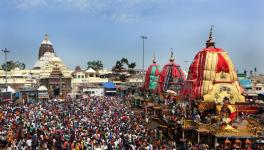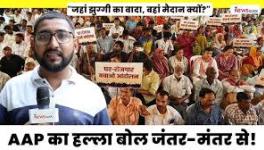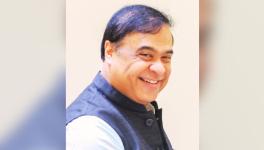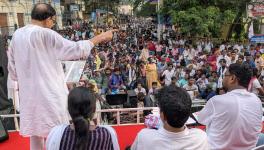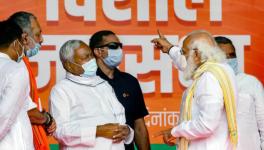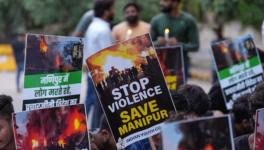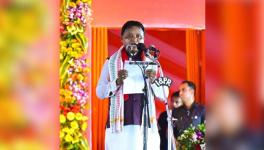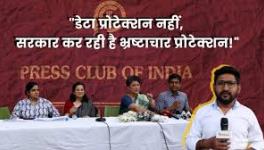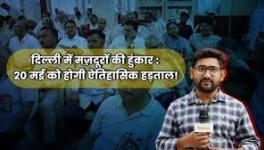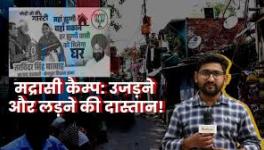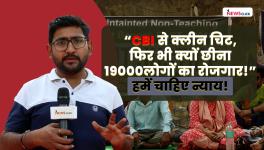Writers Must be Fighters
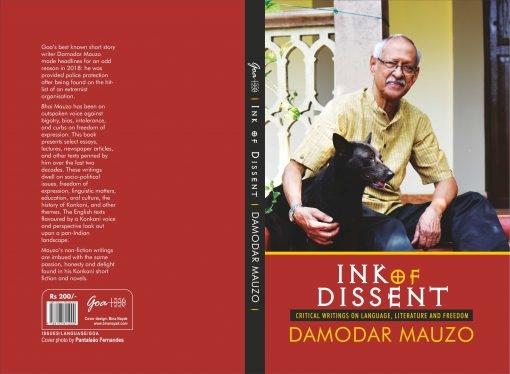
Ink of Dissent: Critical Writings on Language, Literature and Culture is a compilation of the English writings of Goan novelist, activist and Konkani literature's icon Damodar Mauzo. Winner of the Sahitya Akademi Award in 1983, Mauzo has also been a vocal critic of Hindutva extremists, pushing him into the hit-list of the Sanathan Sanstha. The book takes us through the history of Goan literature, its mixed culture, the significance of regional identities, the story of Konkani oral culture, and the importance of writers to stand up to the murder of dissent in the country. The text below is from the chapter 'Writers Must be Fighters' of the book.
Modern Indian literature has consistently stood by the less privileged people of India. Konkani is not far behind, though she joined the mainstream literature a bit late for historical reasons. Dr. Manohar Rai Sardesai’s poem Zayat Zage stands testimony to the historic call given by this poet to the working class of Goa in the ’sixties. He warned the farmers, fisherfolk, renders and paddekars, gaunkars and zonnkars to wake up and face the man-made calamities that would soon befall them. Among the leaders of the freedom movement was poet B.B. Borkar who, facing the wrath of the then Portuguese regime, had addressed a poem to the Governor asking to provide the poor subjects of Goa with proper food and clothing. After the Liberation of Goa, poet Borkar wrote a poem ‘ailam tem swatantrya nhui, tem swatantrya nhui’ (the freedom that has come is not true freedom) wherein he points out that though the colonisers have gone the perpetrators of atrocities continue to harass the common people of this land and hence the Liberation that has come to us is no Liberation. Can anyone call this poem unpatriotic? Was poet Borkar an antinational?
The 16th century chapter that had a Portuguese beginning, came to an end in December 1961, giving this tiny territory a new start with its reunion with its motherland, India. The shift of regime from 450 years of an alien rule to a democratic set up would naturally take some time to sink in. A strange situation then arose. The Hindu majority of Goa sensed elation while most of the Catholic community felt subdued. Those who were brainwashed with slogans like Aqui é Portugal and Viva Portugal were baffled by the Portuguese soldiers surrendering tamely. On the other hand the majority of the Hindu community was jubilant with a feeling that the Christian domination was going to be replaced by Hindu supremacy. Those few affluent bhatkars who took pride in speaking chaste Portuguese until then were no more at ease with the ex-rulers’ language. They embraced Konkani that was once considered by themselves as a language of the criadas (servants). Most of the upper class Goan Hindus instantly and happily dumped the Portuguese language and cuddled Marathi instead of Konkani, not because they despised Konkani but because they believed Marathi would give them an edge over the Catholic community. Those who spoke Portuguese in public were immediately branded as pro-Portuguese, a term that was synonymous with anti-national.
The ‘deputationists’ who came to assist in the administration of Goa were mainly from Maharashtra. This neighbouring State had already staked its claim on Goa on the grounds that Konkani was a dialect of Marathi and therefore Goa should be merged with Maharashtra. Though all Goans spoke only Konkani, just as the Catholics had regarded speaking Portuguese as a status symbol, the Hindus took pride in claiming Marathi as their mother tongue. At the first ever Goa assembly election it turned out to be a battle for domination between the Hindu masses led by the Maharashtrawadi Gomantak Party and the Catholics piloted by the United Goans Party. In the political turmoil that followed, the sane voices of Ravindra Kelekar, Inez Cota Carvalho, Pandurang Mulgaokar, Felicio Cardozo, Anastasio Almeida, Arsenio Jacques, etc. were drowned. Ever since those days, a vertical divide still exists in today’s Goan society.
The freedom fighters who were termed as terroristas by the establishment became heroes overnight. Since many of them were Catholics, it was difficult for the Hindu fundamentalists to label the other community as pro-Portuguese. Though the first Chief Minister of Goa, Dayanand Bandodkar, led the Hindu masses, he had no axe to grind with the Catholics, as he had many close friends from within that community. But it suited him to incite the masses against the upper classes that had exploited the lesser privileged lot. The Hindu bahujan samaj then turned hostile to the upper classes and preferred to club the Hindu brahmins with the Christians.
Konkani literature, despite having a late start, has kept up the spirit of harmony and tolerance and thus helped to project Goa as a land of peace and unity. Sheela Kolambkar, who rose to fame with her unforgettable story Guerra, wrote passionately about the plight of a pregnant woman whose white paramour, a Portuguese soldier, has left the shores of Goa leaving her behind to face the situation. Paklo, a novella by Tukaram Shet, also objectively discusses the predicament of a young mestiço. But no one tried to take advantage of the situation to make things difficult for them.
However, the question remains: ‘Has Konkani literature made an impact on the psyche of the people of Goa?’ Frankly, the answer, though not in the negative, is ‘hardly any’. Nevertheless, one thing that can be vouched for is that it has definitely influenced those in India and abroad to have a proper perception of Goan sensibility. But in the light of what is happening in the rest of the country now, we cannot be sure that the liberal minded Goans can live a tension-free life any more.
‘India is a nation of nations’. I liked this statement recently made by Kanhaiya Kumar, the young firebrand activist. This is precisely why we, in India, enjoy privileges and face problems that aren’t common in most other countries. All over the world, men and women are proud of their own identity. For most of them their national identity and cultural or linguistic identity is one and the same thing. The French are proud of their French identity. They are French because they speak French and also because they live in France. The Japanese are Japanese because they live in Japan and speak the Japanese language. They have an all-in-one-identity given to them by their language, culture and nation. But we in India have a dual identity. One is given by our nation while the other by our language or by the respective linguistic state. In Punjab, we are Punjabis because we speak that language and also belong to that State. But we are Indians too. The people of Karnataka are Kannadigas because of their linguistic identity, and they are Indian by national identity. I am a Goan, a Konkani and also an Indian. Though we are divided as States — which are as good as nations — we are proud Indians because we belong to the great nation called India and the country is known as ‘great’ because of its diversities.
Yes! We have always celebrated diversity. But of late, the situation is changing. Earlier, hardly anyone bothered to know your religion, leave aside discriminate against you. Yes, tensions did exist, mainly among the castes. But despite caste politics the governments rarely allowed the situations to get out of hand. The partition period was the darkest in the history of this subcontinent. But Mahatma Gandhi and our other political leaders at the helm saw to it that those tensions were controlled and defused. Nowadays, even if the situation is on fire, there are no extinguishers seen around. Emotions are seen flaring at the drop of a hat. Situations are being created, monitored and instigated to ignite emotions in the name of nationalism and patriotism. Media persons are quick to report and air their perceptions which are, more often than not, lopsided. People then debate heatedly on the basis of what they see or hear on the TV channels and social media. Until the Kanhaiya case we did not even think of video recordings being doctored.
The aftermath of the JNU episode has brought up an issue that can blow out of proportion in the near future, if not corrected in time. As the whole gimmick is directed against the opponents of the RSS-BJP combine, the beneficiaries are the people in the ruling party. No wonder the Prime Minister is turning a Nelson’s eye to the ongoing tirade by the ‘protectors of Hindutva’. The Sangh Parivar has suddenly become hyperactive. The protagonists of Hindutva have apparently shouldered the responsibility of promoting nationalism. An unwritten proclamation is spreading the message: ‘All Muslims are anti-Indian; all Dalits are traitors; all secular, rational and liberal individuals with leftist leanings are anti-nationals.’ You cannot live in this country without being reminded constantly that it is not sufficient to be a patriot, you have to prove it as and when demanded of you.
When three renowned rationalists of this country were killed by the fundamentalists, followed by the Dadri lynching incident, a group of 14 award-winning writers of Goa publicly voiced their concern over the deteriorating national scenario. They even threatened to return the honours bestowed upon them by the Sahitya Akademi if the national body of letters did not condemn the assassination of the award winning writer of Karnataka, M.M. Kalburgi. A certain Bollywood actor hailing from Kashmir supported the Government amidst the protests against the intolerance. We find such pseudo patriots who are found to be mais papist que o Papa (more of a papist than the Pope). The onus now lies on the Government, that is accountable to the nation, to take stern action against the dirty scenes in the High Court, in the JNU campus, Rohit Vemula case and the ‘antinationalist’ bogeyman. The citizenry of this country is confused. They expect the Government to take action against the erring elements. And yet the HRD minister made an emotionally charged powerful speech which has turned out to be a bunch of lies. What is worrisome is that, in this whole song and dance, the liberal voice is being suppressed.
Recently I was invited by a national TV channel to participate in a live debate on intolerance, Sarkar v/s Sahityakar. The heated debate ran for two hours. There were nearly 15 writers from across the country to take on a BJP minister and an RSS leader. But the entire approach of the TV channel was to allow the leaders to counter the arguments even before the writers put forth their contentions. Many then felt that the whole episode was stage-managed by the channel at the behest of the powers that be. I too felt that they used me and the other writers for their own ends. This has to stop. I think the time has come, as the eminent Konkani writer and Jnanpith awardee Ravindra Kelekar once said, for the writers to become fighters.
Damodar Mauzo is a Goa-based short story writer, novelist, columnist and screenplay writer and has been writing in Konkani for over three decades. He has two novels, four collections of short stories and three books for young adults to his credit.
This is an excerpt from the book Ink of Dissent: Critical Writings on Language, Literature and Freedom written by Damodar Mauzo, compiled and edited by José Lourenço and published by Goa 1556 in 2019. Republished here with permission from the author.
Get the latest reports & analysis with people's perspective on Protests, movements & deep analytical videos, discussions of the current affairs in your Telegram app. Subscribe to NewsClick's Telegram channel & get Real-Time updates on stories, as they get published on our website.









